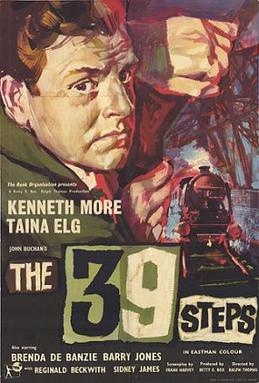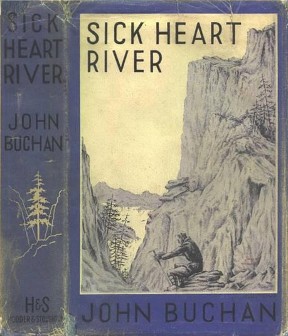Related Research Articles

The Thirty-Nine Steps is a 1915 adventure novel by the Scottish author John Buchan, first published by William Blackwood and Sons, Edinburgh. It was serialized in All-Story Weekly issues of 5 and 12 June 1915, and in Blackwood's Magazine between July and September 1915, before being published in book form in October of that year. It is the first of five novels featuring Richard Hannay, an all-action hero with a stiff upper lip and a knack for getting himself out of tricky situations.

Christopher Eric Hitchens was a British author and journalist who is widely regarded as one of the most influential atheists of the 20th and 21st centuries. Author of 18 books on faith, culture, politics, and literature, he was born and educated in Britain, graduating in the 1970s from Oxford with a degree in Philosophy, Politics and Economics. In the early 1980s, he emigrated to the United States and wrote for The Nation and Vanity Fair. Known as one of the four horsemen of New Atheism, he gained prominence as a columnist and speaker. His epistemological razor, which states that "what can be asserted without evidence can also be dismissed without evidence", is still of mark in philosophy and law.

Greenmantle is the second of five novels by John Buchan featuring the character Richard Hannay. It was first published in 1916 by Hodder & Stoughton, London. It is one of two Hannay novels set during the First World War, the other being Mr Standfast (1919); Hannay's first and best-known adventure, The Thirty-Nine Steps (1915), is set in the period immediately preceding the war.

Benjamin Meek Miller was an American Democratic politician who served as the 39th Governor of Alabama from 1931 to 1935. The Scottsboro Boys affair notably occurred during his gubernatorial tenure.
The 2004 documentary film Fahrenheit 9/11 generated controversy before, during, and after its release a few months prior to the 2004 U.S. presidential election. The film, directed by Michael Moore, criticizes the Bush administration's attempt to pursue Osama bin Laden in the aftermath of the September 11 attacks, as well as the Iraq War. Although Fahrenheit 9/11 was generally praised by film critics and won various awards including that year's Palme d'Or, the content was criticized by several commentators for accuracy, and lack of context. Additionally, the distributors protested Moore's inaction on unauthorized copying.
Major-General Sir Richard Hannay, KCB, OBE, DSO, is a fictional character created by Scottish novelist John Buchan and further made popular by the 1935 Alfred Hitchcock film The 39 Steps, very loosely based on Buchan's 1915 novel of the same name. In his autobiography, Memory Hold-the-Door, Buchan suggests that the character is based, in part, on Edmund Ironside, from Edinburgh, a spy during the Second Boer War, and a British Army field marshal and CIGS.

Mr Standfast is the third of five Richard Hannay novels by John Buchan, first published in 1919 by Hodder & Stoughton, London.
David Robb is a Scottish actor.

The Three Hostages is the fourth of five Richard Hannay novels by the Scottish author John Buchan, first published in 1924 by Hodder & Stoughton, London.

The 39 Steps is a 1935 British spy thriller film directed by Alfred Hitchcock, starring Robert Donat and Madeleine Carroll. It is loosely based on the 1915 novel The Thirty-Nine Steps by John Buchan. It concerns a Canadian civilian in London, Richard Hannay, who becomes caught up in preventing an organisation of spies called "The 39 Steps" from stealing British military secrets. Mistakenly accused of the murder of a counter-espionage agent, Hannay goes on the run to Scotland and becomes tangled up with an attractive woman, Pamela, while hoping to stop the spy ring and clear his name.

The 39 Steps is a 1959 British thriller film directed by Ralph Thomas and starring Kenneth More and Taina Elg. Produced by Betty Box, it is a remake of the 1935 Alfred Hitchcock film, loosely based on the 1915 novel The Thirty-Nine Steps by John Buchan.

The Thirty Nine Steps [sic] is a British 1978 thriller film directed by Don Sharp, with screenplay by British playwright Michael Robson, based on the novel The Thirty-Nine Steps by John Buchan. It was the third film version of the 1915 novel.
Ludovic "Sandy" Gustavus Arbuthnot, later 16th Lord Clanroyden is a fictional character who appears in various books by John Buchan in the Richard Hannay series. These books include Greenmantle, The Three Hostages, The Courts of the Morning, and The Island of Sheep, but not the first in the series, The Thirty-Nine Steps. He also appears in The League of Heroes by Xavier Mauméjean. His particular expertise is in adopting disguises which completely take in Hannay, the "friend [he] knows best in the world".

The Island of Sheep is a 1936 novel by the Scottish author John Buchan, the last of his novels to focus on his characters Richard Hannay and Sandy Arbuthnot. It was published in the United States under the title The Man from the Norlands.

The Courts of the Morning is a 1929 adventure novel by John Buchan, featuring his character Sandy Arbuthnot. The prologue is narrated by Richard Hannay, so the novel is sometimes included in Buchan's Hannay series. The action is set in Olifa, a fictional country on the west coast of South America.

Sick Heart River (1941) is a novel by Scottish author John Buchan set in Canada. It was published posthumously. The book was published in the United States under the title Mountain Meadow.
Peter Pienaar is a character from John Buchan's series of Richard Hannay books. He is described by Hannay as being "five foot ten, very thin and active, and as strong as a buffalo [with] pale blue eyes, a face as gentle as a girl's, and a soft sleepy voice."

Muirtown is an area in the west end of the city of Inverness in the Scottish Highlands. It contains the Muirtown basin and Muirtown Primary School.
Sir Archibald Roylance was a fictional character created by John Buchan. He appeared in many Buchan novels, never as the protagonist. He was a good friend of Richard Hannay and Edward Leithen despite being younger than them.

The Half-Hearted is a 1900 novel of romance and adventure by the Scottish author John Buchan. It was Buchan's first novel in a modern setting and was written when he was 24 while working for an All-Souls fellowship and reading for the bar.
References
- ↑ John Buchan, The Complete Richard Hannay Stories. ISBN 978-1-84022-655-3 (Wordsworth Classics, 2012).
- ↑ Hitchens, Christopher (March 2004). "Great Scot". The Atlantic . Retrieved 22 September 2019.
- ↑ Moore, Charles (16 July 2005). "A warning from the past that the BBC does not want us to hear". The Daily Telegraph . Retrieved 30 April 2016.
- ↑ Taylor, H. E. (2015). "Conquistadors: Buchan's Businessmen". Reassessing John Buchan: Beyond the Thirty Nine Steps. Routledge. p. 131. ISBN 9781317303404 . Retrieved 22 September 2019.